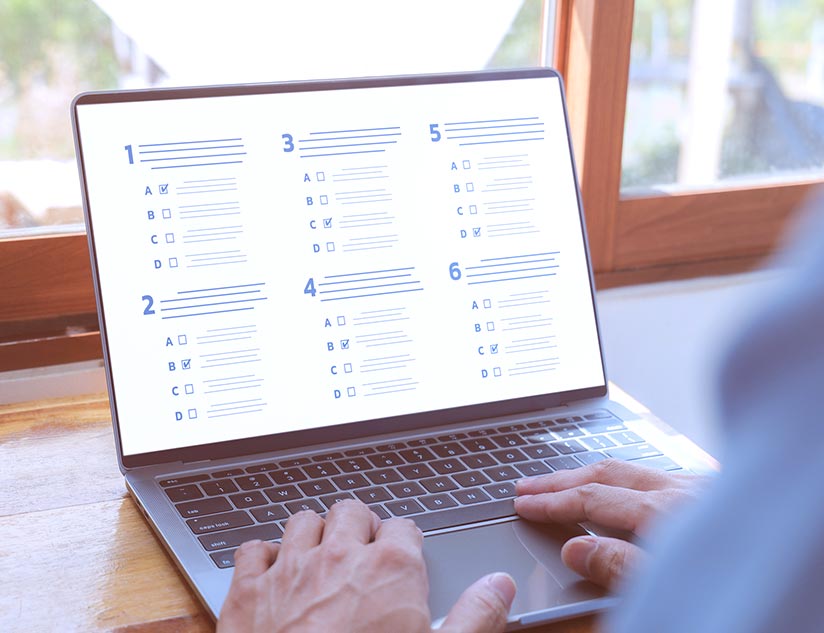The online exam proctoring market is forecast to expand into a $1,742.95 million industry by 2028. A key driver of this growth is the increased adoption of digital assessments. The education industry is embracing digital assessments as a transformative tool to facilitate personalized learning. Online assessment platforms have powerful tools and technologies to adapt the exam schedule, type, and difficulty level according to learner needs, preferences, and goals. Plus, with the ability to analyze student and learning material data, digital assessment tools enable faster, better, and more effective education delivery.
How Online Learning Assessment Tools Facilitate Personalized Learning
Evaluations in the digital learning ecosystem can be of any type: quizzes, tests, surveys, video-based skill demonstrations, self-driven projects, group projects, and more. Data extracted from these diverse assessment types can help define personalized learning paths for learners in the following ways:
Identify Student Needs
Online learning systems track student progress, speed, time needed to acquire or assimilate knowledge, and learning styles. Online learning assessment tools use this data to curate assessments that align with each learner’s unique learning paths and goals. These tools clearly show individual strengths and weaknesses, elevating the learning experience and facilitating targeted evaluation.
Provide Real-Time Feedback
Real-time feedback is one of the most pronounced advantages of automated scoring, which is made possible with AI-powered and NLP-enabled digital assessments. This helps students correct mistakes and work on areas of improvement throughout the course duration. Such tools also recommend reinforcement measures and enable the reassessment of specific modules to ensure improved learning assimilation.
Track Student Progress
Online assessment platforms relieve teachers of administrative duties and tracking of student progress over time. This frees educators to focus on providing additional learning support to students struggling in certain areas.
Ensure Equity and Accessibility
Online exams deliver equity through an unbiased and uniform grading system. Further, anonymizing student details reduces bias against students, especially for remote learners. These tools help break social, geographical, and learning barriers by providing a level playing field through accessible software. For instance, digital assessments can be integrated with tools to support students with special needs, such as real-aloud and speech-to-text facilities for students with visual impairment.
Examples of Digital Assessment Tools for Personalized Learning
A few popular categories of questions in online assessments are single-choice questions, reordering, match the following, and multiple-choice questions. Some of the most effective digital assessment tools to add to your learning technology bouquet are:
Gamified Assessments
From the most straightforward drag-and-drop to strategic gamified questions, the goal is to enhance the examination experience and eliminate fear around exams. Such assessments can also be converted into group activities to foster collaborative learning and increase engagement. These tools allow educators to use predefined formats or create their own parameters to bolster assessments and education with enjoyment.
Interactive Video-Enabled Q&As
Video-based assessments can transform the examination system. Firstly, they elicit answers, helping students become more vocal. Video sessions allow real-time skill demonstration and personalized feedback directly from the teacher or NLP-powered tool. Along with a personal touch, they enable teachers to give time-stamped one-to-one feedback.
Assistive Technologies
Digital assessment tools equipped with assistive technologies improve inclusion. For instance, learning assistants to help students with motor difficulties, text-to-speech converters to assist those with visual impairments, audio-to-text for those with hearing impairments during live sessions, etc., can transform learning and examination experiences.
Tips to Leverage Digital Assessments for Personalized Learning
- Choose the right assessment by assessing learner needs and educational goals.
- Create assessments that align with the objectives of the course or learning module.
- Provide students with clear instructions on how to complete the assessment.
- Offer students multiple opportunities to complete the assessment to alleviate exam-related anxiety.
- Use the assessment data to inform your teaching and provide students with personalized support.
Digital Assessments for Better Learning Outcomes
Through valuable insights into strengths, weaknesses, progress, and student motivation, digital assessments hold the key to transforming learning experiences and driving learners to achieve higher academic outcomes. A key benefit of digital assessment tools for teachers is the ability to provide timely intervention while facilitating bias-free grading.
Regulatory compliance-enabled digital assessment platforms are strengthened with data security measures while facilitating remote proctoring and time-bound assessments. Increased flexibility to take assessments anytime, anywhere improves accessibility and offers learners better opportunities to complete their educational journey. Additionally, the adoption of gamification and video-based examinations improves exam-taking experiences.
Education providers must adopt digital assessment tools and support personalized learning with immediate feedback and improvement facilitation to keep pace with the rapidly evolving digital learning ecosystem. This requires the integration of cutting-edge technology tools into the existing learning ecosystem. MagicBox’s API-based solutions upgrade assessment platforms for modern learning environments without requiring a complete technology overhaul. Contact the experts now to augment your LMS with an advanced and compliant digital assessment platform and stay ahead of the curve.















